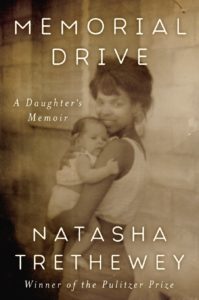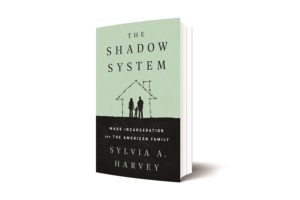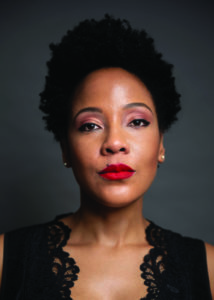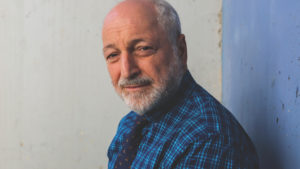In “Monument,” a poem in Native Guard, Natasha Trethewey describes watching ants bring soil up from her mother’s grave. “Believe me when I say/ I’ve tried not to begrudge them/ their industry, this reminder of what/ I haven’t done. Even now,/ the mound is a blister on my heart,/ a red and humming swarm.”
Trethewey, twice named Poet Laureate of the United States, won a Pulitzer Prize in 2007 for Native Guard. She has long distinguished herself by turning her eye and tuning her ear to this country’s traumatic history of slavery and racism. But she has not, until the publication of her most recent book this summer, applied the full force of her industry to her own personal trauma — her mother’s violent death at the hands of Trethewey’s stepfather. This book, Memorial Drive: A Daughter’s Memoir, lays bare the events that blistered her heart and also set her course as a writer.

Trethewey begins Memorial Drive by narrating a dream she had in 1985, three weeks after her mentally ill and abusive stepfather shot and killed her mother, Gwendolyn Ann Turnbough. In the dream, Turnbough, light streaming from a quarter-sized hole in her forehead, poses a question to her daughter: “Do you know what it means to have a wound that never heals?” Trethewey, 19 at the time, cannot answer, but she understands that it is not just her mother who is incapable of repairing the damage done.
With energy and industry, Trethewey spends more than three decades avoiding memories of her own history, dwelling in a “silence and willed amnesia buried deep in me like a root.” The memoir is her attempt “to understand the tragic course upon which my mother’s life was set and the way my own life has been shaped by that legacy.” The power of her insights and gifts as a writer are no less evident in her prose than in her poetry.
Trethewey has often shared the outlines of her early life and revisits them in Memorial Drive. Her father was white and from Canada, her mother, black and from Mississippi. They were married in Ohio, because in 1965 it was still illegal for blacks and whites to marry in Mississippi. Her parents settled among Turnbough’s “tight circle of extended family” in North Gulfport, Miss., a place where Trethewey felt “protected, insulated from racial intimidation and violence.”
There are two branches of the story’s roots that Trethewey begins to untangle in the early sections of Memorial Drive. One, though serious, is not without irony. Trethewey’s family watched the Klan burn a cross on its front lawn. But the menacing, building violence in Trethewey’s buried story doesn’t come from hate-filled whites. Joel Grimmette, Turnbough’s second husband and Trethewey’s stepfather, is black. It is his spectacular ability to torment that shapes the bulk of the memoir, which takes place in Atlanta.
The second branch leads to the development of her writing self. Like the first branch, it, too, in its own way, is connected to trauma. Both of her parents, she explains, but especially her father, played a role in her “thorough education in figurative language.” Both loved to read and provided her with books. Both appreciated the genius of metaphor. Out walking one day, Trethewey overhears white kids calling her a “zebra.” It is her first inkling of how the world will deny her respect as a person of mixed race. And it is also her appreciation that the term, though vile, is a metaphor.

Midway through the memoir, it turns and takes off in a two-page section titled “Pardon.” Trethewey uses words to craft a freeze-frame of herself and her baby brother, Joey, and her mother and stepfather. She sees the four of them reflected in a mirror. She turns her head to the TV. Gerald Ford is pardoning an entirely guilty Richard Nixon. Trethewey observes two American tragedies playing out simultaneously. She quotes Ford: “It could go on and on and on, or someone must write the end to it.” That someone, readers understand as they move into the unfolding “now” of this particular family’s tragedy, will be Trethewey herself.
In the second half of the book, Trethewey plumbs the depths of her stepfather’s guilt. She has, against her better instincts, moved back to Atlanta. A chance meeting with a police officer on duty the day her mother died leads to a cache of files containing words her mother wrote and spoke. Tretheway must make sense of what happened at her mother’s apartment on Memorial Drive.
Joan Didion and Adrienne Rich take pride of place near Memorial Drive’s end. Trethewey uses them to comment on memory, story, and self. Another writer came to my mind, one whose sheltered, white Mississippi childhood was a universe away from Trethewey’s. In One Writer’s Beginnings, Eudora Welty noted, “The events in our lives happen in a sequence in time, but in their significance to ourselves they find their own order, a timetable not necessarily — perhaps not possibly — chronological. The time as we know it subjectively is often the chronology that stories and novels follow: it is the continuous thread of revelation.”
In Memorial Drive, Trethewey has had the courage to go back in time to order the events around her mother’s death and attend to the blister on her heart. Perhaps, by engaging in this agonizing process, the revelations she has found diminish her pain. Readers of Memorial Drive can expect to share Trethewey’s agony. They can also expect to be moved and enlightened by what she finds as she grapples with her mother’s question about what it means to have a wound that never heals.














 With uncanny prescience, German sociologist Ulrich Beck described that understanding in his 1992 book, Risk Society. The Chernobyl nuclear disaster still a recent memory, Beck discerned previously unimaginable risks growing in tandem with industry, endangering humankind. Modern risks, he claimed, differ from others in their lack of an immediate, personal quality. These are not workplace accidents or perils at sea; these risks are intangible — the very air we breathe, the food we consume, the water we drink now a conduit for harm we cannot see or feel.
With uncanny prescience, German sociologist Ulrich Beck described that understanding in his 1992 book, Risk Society. The Chernobyl nuclear disaster still a recent memory, Beck discerned previously unimaginable risks growing in tandem with industry, endangering humankind. Modern risks, he claimed, differ from others in their lack of an immediate, personal quality. These are not workplace accidents or perils at sea; these risks are intangible — the very air we breathe, the food we consume, the water we drink now a conduit for harm we cannot see or feel.




